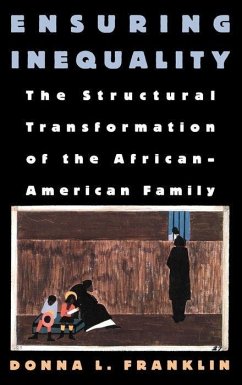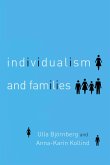This text analyzes the evolution of the contemporary African-American family from historical, cultural and social policy perspectives in an effort to understand why marital ties have weakened among poor African-Americans and why mother-only families have increasingly become a normal feature of ghetto poverty. It argues that the cumulative effects of slavery, sharecropping and urbanization significantly weakened African-American family ties and that mother-only families emerged in the early 20th century as a response to the instability of wage labour for African-Americans.
There is a crisis today in the American family, and this crisis has been particularly severe in the African American community. Black women are more likely than ever to bear children as teenagers, to remain single, and to raise their children in poverty. As a result, a staggering number of African-American children are growing up without fathers and living in destitution. In this insightful new book, Donna L. Franklin offers an in depth account of the history and development of the African American family, revealing why the marriage and family experiences of African-Americans differs from those of white America, and highlighting the cultural and governmental forces that have combined to create this divide and to push the black family to the edge of catastrophe. In Ensuring Inequality, Franklin traces the evolution of the black family from slavery to the present, showing the cumulative effects of centuries of historical change. She begins with a richly researched account of the impact of slavery on the black family, finding that slavery not only caused extreme instability and suffering for families, but established a lasting pattern of poverty which made the economic advantages of marriage unattainable. She provides a sharp critique of the policies of the Freedmen's Bureau during Reconstruction, and demonstrates the mixed impact of the new pattern of sharecropping. On one hand, tenant farming allowed greater autonomy than the older gang labor system, and tended to consolidate two parent families; on the other hand, it reinforced male authority, and bound African Americans in debt peonage. The twentieth century brought a host of changes for black families, and Franklinincisively examines their effects. First, black women began to move to cities in search of jobs as domestic servants, while men stayed behind to work the fields, dividing the families. Then, two world wars sparked the great migration north, as African Americans pursued e
Hinweis: Dieser Artikel kann nur an eine deutsche Lieferadresse ausgeliefert werden.
There is a crisis today in the American family, and this crisis has been particularly severe in the African American community. Black women are more likely than ever to bear children as teenagers, to remain single, and to raise their children in poverty. As a result, a staggering number of African-American children are growing up without fathers and living in destitution. In this insightful new book, Donna L. Franklin offers an in depth account of the history and development of the African American family, revealing why the marriage and family experiences of African-Americans differs from those of white America, and highlighting the cultural and governmental forces that have combined to create this divide and to push the black family to the edge of catastrophe. In Ensuring Inequality, Franklin traces the evolution of the black family from slavery to the present, showing the cumulative effects of centuries of historical change. She begins with a richly researched account of the impact of slavery on the black family, finding that slavery not only caused extreme instability and suffering for families, but established a lasting pattern of poverty which made the economic advantages of marriage unattainable. She provides a sharp critique of the policies of the Freedmen's Bureau during Reconstruction, and demonstrates the mixed impact of the new pattern of sharecropping. On one hand, tenant farming allowed greater autonomy than the older gang labor system, and tended to consolidate two parent families; on the other hand, it reinforced male authority, and bound African Americans in debt peonage. The twentieth century brought a host of changes for black families, and Franklinincisively examines their effects. First, black women began to move to cities in search of jobs as domestic servants, while men stayed behind to work the fields, dividing the families. Then, two world wars sparked the great migration north, as African Americans pursued e
Hinweis: Dieser Artikel kann nur an eine deutsche Lieferadresse ausgeliefert werden.








